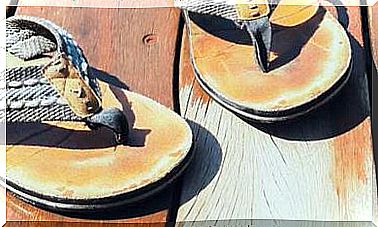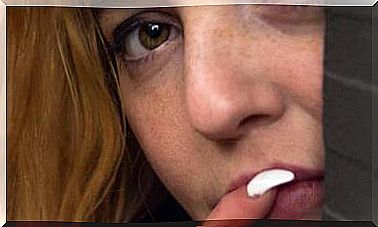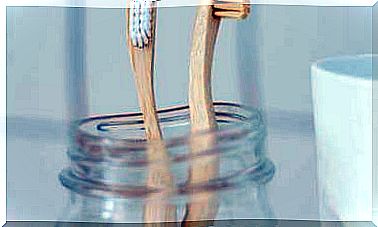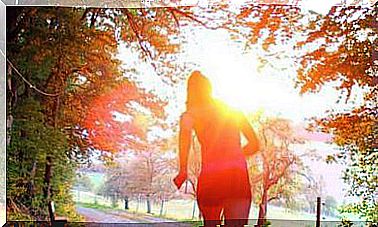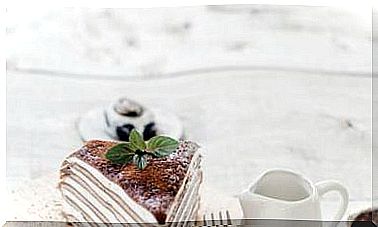“We Are All Unique And Extraordinary Beings”
Interview with Swami Rameshwarananda Giri, teacher of Vedanta yoga and president of the Phi Foundation. It shows us how to discover yourself with meditative practice.
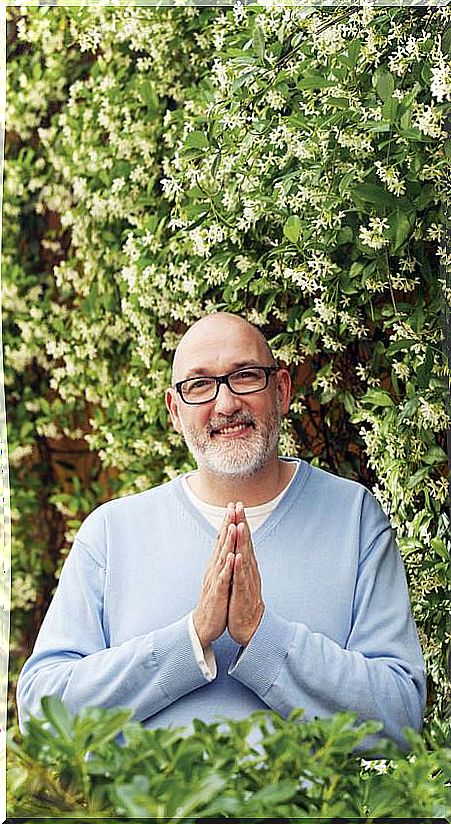
He began to meditate when he was 5 years old and at 47 he says that silences are more united than words. However, the wisdom of his reaches many hearts every day. Swami Rameshwarananda Giri (Félix Balboa, Bilbao, 1968) has dedicated his life to knowing himself by taking the path of silence.
Hand in hand with his mother, at the age of seven he entered a hatha yoga school where he received training in different physical and mental disciplines. At the age of 25 he took the vows of swami (which in Sanskrit means “master of himself”) within the Advaita Vedanta Sannyasin order.
He currently chairs the Phi Foundation, which promotes projects such as the University of Consciousness or the School of Yoga Vedanta and Meditation of Valencia.
Awakening through meditation
– Who is Swami Rameshwarananda Giri?
–I remember the day when I had to meet my teacher in India for the second time. I was very anxious. When I arrived I found him taking a walk with one of his disciples and he did not recognize me.
I began to explain who he was by giving him data and more data. He let me go for more than 20 minutes and after my long speech he still didn’t remember me. I continued a little more with my explanations until he said to his disciple: “look, another who does not know who he is”.
He wanted me to realize that I was no longer who I thought I was.
– Is it a common mistake?
–The problem is that we believe we have a continuous self, but it is neither continuous nor solid and we want to increase this solid and continuous self by fighting uselessly against our transience.
But we are all unique and extraordinary beings. If we were to connect with that in depth, we would not fall into a lack of self-esteem, we would not fall into depression. I think that we are overwhelmed by the acquired knowledge and that we focus on external things paying very little attention to what happens inside.
We do not realize the importance of our presence in the world. We are always looking to complement ourselves with something or someone to fit in. What needs to be investigated is the path of freedom and “selflessness.”
Go one step beyond the ego
– What is “selflessness”?
–The dictionary does not include this word. In opposition to selfishness we speak of altruism and generosity. But doing good does not neutralize all the evil that is inside.
However, those who sincerely and deeply apply themselves to solving everything that does not work in themselves only leave good as an answer.
Many people tell me: “I want peace.” Well, take away the “I” and the “want” and you will have peace. It’s about being fearless when tackling everything that doesn’t work well for you. To the extent that you solve everything that does not work well in you, you have a natural state of openness towards everyone who approaches and you are no longer afraid, nor are you dragged by guilt, dependency, needs, or opportunism .
“Many people tell me: ‘I want peace.’ Well, take away the ‘I’ and the ‘I want’ and you will have peace.”
You have the choice to act or not to act. To express yourself or not to express yourself.
The absence of “selfishness” means not living things as if they belong to you, but keeping your hand open.
The ego appropriates every moment, every emotion, every thought … it would be something like the one who has clearly perceived the movement of those great butterflies in Brazil and decides to share that experience with everyone who lives in Europe. He hunts the butterfly, nails it to a cork and puts it in a display case and brings it here.
For me intelligence is the ability to transform every moment of your life into a happy moment. And that means “not doing”, stopping and cultivating a silent mind.
– What does “not do” mean? I think: ‘okay, but… what to do’?
–It means doing, but without acting from the ego. Action is born from yourself. It is like understanding the difference between knowledge and wisdom.
Knowledge moves and adapts, while wisdom is one and static. They inject a lot of information into us, but we don’t let what we carry within us express itself.
It is possible that an eighteen-year-old, even already in college, has never addressed the question of what to do with anger, what to do with his anxiety … perhaps there is no one capable of telling him, because neither his teachers know what to do with his anger.
In education it is not allowed to address issues fundamental to the human experience. We live in a highly technological and organized society, but more civilization more insensitive. We seek balance but it is not on the outside, no matter how hard we try; resides within us.
“In education it is not allowed to address issues fundamental to the human experience.”
– Do we have an ego sick society?
What happens today is that talking about selfishness is almost talking about something positive. You defend yours!
Also happiness in the sense of: “Think only of yourself” has done a lot of damage because it leads us to seek an artificial and external happiness.
Understand how the mind works to identify the Right
–You started spiritual practices when you were 5 years old. Would it be important to introduce them in children’s education?
-I do not know. I maybe required it. Seeing my mother in a very strict practice of meditation, having next to that icon of balance that represented having a person absolutely dedicated, concentrated and available, helped me. A disciplined person in the inner sense exudes a lot of balance and harmony and that influenced me very positively.
I was very nervous and I noticed that it did me good. He was surrounded by adults who were working not to improve, but to get to know themselves. And that aroused the same longing in me because what they seemed to experience was visibly interesting.
At thirteen I met my first spiritual director, Father Ochoa, a Jesuit, who showed me how intensity transforms into depth.
I understood that meditation does not seek to obtain anything, it has no objectives, but consists of identifying one’s own confusion that one drags, one’s own paranoia. In understanding how your mind works, exposing it to simple limits to see how its reaction is, understanding to what extent it is your friend and to what extent it is your enemy. And slowly identify what is Right for you, with capital letters, and make it yours. Identify what is wrong and eliminate it tenderly or sometimes firmly.
“I understood that to meditate is to discover that there are spaces within you willing to help you.”
–As a spiritual man that you are, in the face of day-to-day difficulties, do you feel helplessness, frustration, difficulties in relationships…?
– We all experience the same thing, but with a different perspective. A cushion stuck to the face only makes it dark. At a certain distance, it allows us to contextualize everything in a different way and at a distance things seem to lose volume.
It is a matter of perspective on what happens and not so much of not feeling. You feel, but you don’t experience things personally. They don’t drag you down.
Sometimes we imagine a person who has reached a degree of awakening as someone who is floating in the air, but I believe that there are no feet that touch the ground more than those of an awake person. It means that the perspective from which you analyze the problem is not personal.
“There are no feet that touch the ground more than those of an awake person.”
We are witnesses of life
–And in the face of illness, loss, death?
-It is not personal. A silent mind does not label, therefore it experiences the moment directly, as it presents itself.
I don’t mean to say that you can’t feel sadness, but you don’t get attached to it. The right word would be “detached”, which does not mean “absent”.
Once I was in Japan visiting an extraordinary being and a poisonous snake appeared. At the moment when it seemed that it was going to bite a person who was accompanying us, the snake stared at it and slowly moved so that this person who was going to be bit jumped on top and smashed its tail.
The snake, without aggressiveness, continued on its way, probably to die. The person who had suffered the mishap said: “It almost bit me and I died.” The spiritual man replied: “The possibility does not exist.”
-I do not understand well.
– People ask me: Can we change the script of the film? Nobody cares about regaining spectator status.
There is a condition of witness detached from everything that is our own. The witness was never born and will never die.
We talk about reaching that state, but it is our own. That is why I find it difficult to explain how to achieve something that we already are. Everyone asks me the same thing when in reality the process is to get rid of the excess.
The key is to be the witness, the spectator, who can even change rooms.
A disciple of Mother Teresa of Calculta asked her: “Mother, what do I lack to be spiritual?” and she replied: “Rather what is left over daughter, what is left over you.”
To grow you need time and commitment
– Could you tell me about the stages of the transformation process since I made the commitment to sit down?
– Let’s say we are the seed of a tree. It has all the information to be a tree, but it requires a proper context to grow.
When you plant it, at first things explode, roots grow and lumps come out that do not like anything. The lentil has roots, but nothing can be seen coming to the surface. People say, “I don’t see progress.”
You have to wait, be patient and allow your potential to find its space. During the process there are things that make us happy and others that make us uneasy.
People begin to meditate in the hope of finding a moment of peace and are faced with boredom, with their own irritation and with the irritation of their surroundings. And accompanying all this is not easy.
Commitment is what is really important. Sit back and continue. I assure you that if you are able to sit regularly for five or ten minutes in the morning and five or ten minutes in the afternoon, if possible always at the same time, by the second year this habit will have transformed your heart and your life.
“Commitment is the really important thing. Sit down and carry on.”
We experience ourselves as separate, solid and continuous entities, but we are neither solid nor continuous. And there is the difference between an awake being and one that is not.
The awakened being does not conceive of itself as a solid and continuous entity, therefore there is no fracture, but consciousness of unity. It does not go towards what surrounds it because it is not separate from that unity.
But that experience cannot be understood from the condition of separation.
“Even so … what is a silent mind like?”
– Look, the question is: “What am I going to do with the time I have left?”
I chose to know myself. I wanted to find answers that were not based on knowledge, because it leads us to new questions that are never finished being answered.
It is difficult to understand that silence unites us and that words separate us because we believe that words bring us closer. However, the fact that two people are able to share their respective silences in love can unite enormously.
If one works deeply to transform everything that is not working in oneself, the connection that comes from that feeling of openness manifests itself. Obviously the art of not doing is not captured in a single instant.
–Receive hundreds of emails asking for help.
“I attend to the imminent suicides first.” No one can save another’s life if someone is determined to take it from him.
Each one must respect their own movement. We must not allow anyone to establish authority over what is going on within us.
But you can tell the truth and be available. Explain where my experience has led me, that I have also suffered, that I also know what death is. Tell him that he still has time to do things that have a solution.
The first thing is that they feel that they have nothing to fear because you do not judge. When you do not judge, you leave the other to feel free to be himself and rediscover himself as someone new. This with children works very well, with patience.
The family problem is always the same: you think you know the other with a fixed idea of what they are like, but each person changes at every moment.
– Your Phi Foundation project, does it have to do with another way of life?
– People tell me: “What a new project!”. It is simply a question of going back to the origins. I do not pretend to be a reformer, far from it, but to apply common sense.
